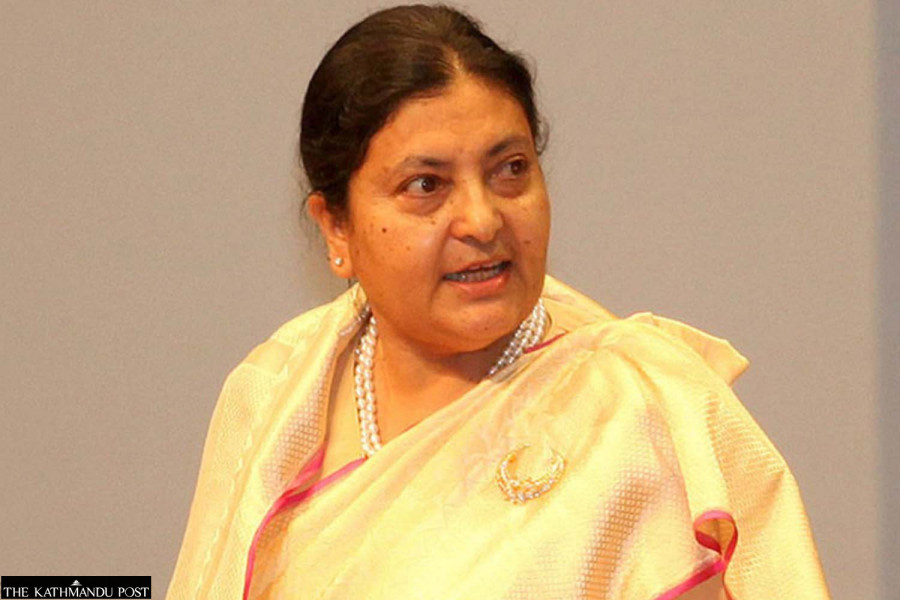Politics
Constitution experts rule out another term for President Bidya Bhandari
Some UML leaders are insisting that the sitting President should be re-appointed to the post. The election for the next President is likely to take place by mid-February.
Purushottam Poudel
The Constitution of Nepal, 2015 only permits two terms of five years each to an individual to serve as the President of the country. As per the constitution, the current term of President Bidya Devi Bhandari is set to be completed in March. However, some of the leaders of CPN-UML are advocating another term for President Bhandari, according to a party insider.
The seven-party coalition which leads the present government under the CPN (Maoist Centre) chair Pushpa Kamal Dahal is believed to have decided to give the post of President and Speaker to the UML, which is the largest party in the coalition. The election of the Speaker is set for Thursday, whereas the election of the next President is expected to take place by mid-February.
Some of the UML leaders are insisting that the present President should be re-appointed to the post.
“Though such discussions have not come up at the official level, some of the party leaders who are close to her in various forums are advocating for repeating her as President,” a party insider who didn’t want to be identified, told the Post.
President Bhandari prior to becoming the second President of the country on October 28, 2015, was a vice-chair of the UML. She was appointed President for a second time on March 13, 2018, after the federal and provincial elections of 2017. President Bhandari is believed to have a strong hold in the party, despite being at the helm of the constitutional post. Therefore, some of the UML leaders who still are in close contact with her are lobbying for her re-appointment as President, said the party insider.
The leaders and the interest groups that are lobbying for reappointing Bhandari as President argue that during her first term, she served only for two years of the five-year term. Moreover, she was chosen by the House of Representatives, they argue.
But now, there is a new provision whereby the President will be selected by the Electoral College which comprises the Houses of the federal parliament and all seven provincial assemblies.
“Though the argument made in favour of reappointing Bhandari as President cannot be dismissed, technically, she has already served as President for two terms, therefore, repeating her in the post would be a constitutional breach,” constitutional expert Bipin Acharya told the Post.
“The post of the President is for the inclusive purpose. Therefore, a person who already has served in the post for two terms, should not be repeated,” said Acharya. “A new candidate should be given the opportunity.”
Another constitutional expert, Bhimarjun Acharya, while speaking to the Post also confirmed that some of the leaders of the UML had approached him to learn about the possibility to repeat Bhandari as President.
“Some UML leaders had approached me to discuss the possibility of re-electing Bhandari,” said Bhimarjun Acharya. “But, giving her a third term as President is not permitted by the Constitution.”
The Constitution of Nepal Article 63 states that the term of office of the President shall be for five years from the date on which he or she is so elected. Whereas Article 64 (2) of the constitution mentions that a person who has already been elected twice as President shall not become a candidate in the election for President.
Deputy-general secretary of the UML, Pradeep Gyawali, in his latest interview with the Post also confirmed that discussions about repeating the present President Bhandari for yet another term had taken place within the party. However, he denied such a possibility.
“There will this time be a new candidate for the post of President,” Gyawali told the Post.
Tika Dhakal, information and communication advisor to President Bhandari also denied the possibility of President Bhandari being re-appointed to the post.
“Leaders might have discussed this with constitutional experts. It is their prerogative, but I don’t think that the President herself would like to get re-appointed.”
On Tuesday, Prime Minister Dahal summoned an all-party meeting to discuss the election of President and Speaker with the parties that had supported him in the trust motion on January 10. Nepali Congress despite being the opposition party had given the vote of trust to Prime Minister Dahal expecting support from the Maoist Centre in the Presidential election. This also created confusion among major coalition member parties—UML and Maoist Centre—regarding power-sharing.
Prime Minister Dahal, however, in the all-party meeting reiterated that he will go with the decision of the ruling coalition.




 18.12°C Kathmandu
18.12°C Kathmandu















